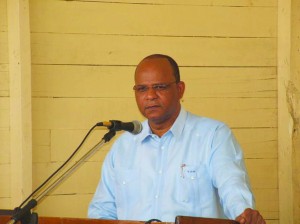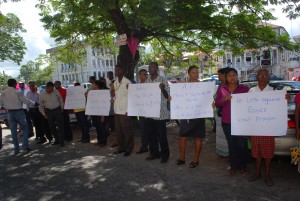– “Opposition engaging in campaign of vilification”

In light of the swirl of allegations levelled against Home Affairs Minister Clement Rohee following the opposition-backed Linden protest, on Wednesday, the minister appeared before the commissioners, contending he was the subject of a vilification campaign.
“The efforts of linking me to the shooting to death, I think is politically motivated by virtue of my political responsibility as a minister and the current campaign of vilification that has subsequently ensued and currently taking place, finds its genesis to that accusation,” he stated, when asked by Attorney Ganesh Hira about the allegations in the media and other fora (peddled by opposition elements).
The minister added: “… by virtue of allegations made to the effect that phone calls were made by me prior to the shootings and that those phone calls had to do allegedly with instructions to shoot, and from there the campaign flow.”
When asked if he gave anyone any instructions to shoot the protesters on July 18 at Linden, he minister confidently replied in a definitive “no”. The opposition lawyers have unable to prove that the minister gave instructions to the police and thus far, notwithstanding the allegations levelled against the minister, there is no incriminating evidence against him regarding the shooting of the three protesters on July 18 at the opposition-backed protest.
Attorney Nigel Hughes, the representative of the Alliance For Change (AFC), who is also representing the interests of the three deceased persons, in cross-examining Minister Rohee, asked the minister whether in his six years of being the home affairs minister, if he had initiated the process to change the standard operating procedures of the police in relation to crowd control. A confident Rohee responded in the positive, noting that there have been discussions, but it was left to the police.
The attorney then questioned the minister about the acquisition of the water cannon asking whether it was done to be in compliance with the United Nations requirements for use of non-lethal force and Rohee replied saying that what was foremost in his mind at the time was the fact that the water cannon was bought as requested by the force.
The minister then revealed that he did not make any enquiries as to whether the water cannon would be dispatch to Linden, nor did he enquire about the level of equipment the police will have available on July 18. He then said that he made no other enquiries since he found the briefing satisfactory.
Briefing with Brummel
The minister then noted that after the meeting on July 17, he had a briefing with the commissioner, who informed him that he is preparing to set up a half unit in Linden, and assured that the ranks will be able to handle the situation, adding that after that, everything to do with the “ops” was left to the force.
Hughes then proceeded to question the minister about calls he made, to whom and the duration of the calls. The minister on the morning of July 18, he did not receive updates from the police commissioner, relating that the bridge was completely blocked.
He further stated that between 20 and 21:00h on July 18, he received information that persons were injured, and he contacted the commissioner, who was able to confirm the information; however, he later tried calling him but was unsuccessful, hence, he (the minister) called Hicken for information.
The attorney then pointed out that the phone records reflected that the minister had called Brumell for one second before calling Hicken for over six minutes. In explaining the duration of the call, Rohee said that the call to the then E and F commander was a detailed one in which he was informed that the bridge was blocked, trucks and buildings were burning, and the behaviour of the protesters towards the police.
The attorney stated that according to the phone records, the call to Hicken was the longest the minister had made so far on that day, suggesting that the minister did not want to talk to the police commissioner, but went straight to Hicken for the information, an assertion the minister rejected.
As the attorney continued to probe the phone records, Jamaican Senior Counsel Keith Knight intervened informing the attorney that rather than him questioning to whom calls were made and for how long, he should try to further the proceedings in getting closer to the truth.
“You do not want to be involve in a futile exercise… bring us closer to the position where with a witness like the minister, you can cause us to go closer to the truth of what happen at Linden on 18th July, 2012” Commissioner Knight told Hughes.




